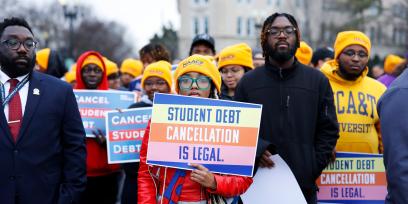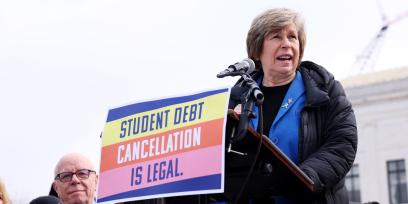Inside the U.S. Supreme Court Feb. 28, robed justices sat listening to oral arguments about whether to cancel student debt for millions of Americans. Outside the building, advocates and activists rallied to support debt relief, sharing personal stories about the heavy weight of student loans and framing the issue as one of equity and racial justice. Some traveled miles to raise their voices; others slept outside the night before in order to gain entry to hear the proceedings.
The message on the streets was clear: Higher education should be accessible to all, without a load of debt attached to it. Student debt cancellation—as outlined in President Joe Biden’s plan to cancel up to $20,000 for borrowers who earn less than $125,000—is legal, just and necessary.
“This is about the people, and it is about the people’s future,” AFT President Randi Weingarten told the crowd. “We’ve said to young adults over and over and over again, ‘go to college.’ But part of this bargain is if we go to college and stay in college, we have to make sure it’s affordable.” Instead, we are saddling young people, families and even older Americans with ballooning debt some feel they’ll never be able to repay.
When Biden announced the Department of Education would cancel up to $20,000 of federal student debt—$10,000 for borrowers who earn less than $125,000 (for married couples, less than $250,000), and $20,000 for Pell Grant recipients who meet these income requirements—challengers argued he could not issue such a policy without congressional approval. That legality was the substance of the day’s arguments in court. Aside from the fact that student loan debt has climbed to $1.7 trillion nationally and is preventing borrowers from reaching basic milestones like starting families, launching businesses and buying homes, the AFT and others argue that Biden’s debt cancellation is unquestionably legal because it is connected to the HEROES Act, a policy activated by national emergencies such as the COVID-19 pandemic.
“The Biden administration has the authority to forgive federal student-loan debt under the HEROES Act, which allows the secretary of education to ensure borrowers are not ‘placed in a worse position financially’ as to their student loans because of a national emergency,” explains Weingarten in a SCOTUSblog post. The AFT filed an amicus brief that uses the same reasoning and outlines the dire straits many borrowers find themselves in due to unmanageable debt.
"We're here today because President Joe Biden has the legal authority to cancel student loan debt,” Sen. Elizabeth Warren (D-Mass.) told the crowd on Tuesday. Warren talked about the “millions of working families” being “crushed by student loan debt.” But, she said, “if the Supreme Court follows the law instead of playing politics, then student loan debt will be canceled.”
“Right now we have 45 million young people drowning in student debt,” said Sen. Bernie Sanders (I-Vt.). “I have talked to people who have literally delayed having a family. They can’t have any kids. They can’t afford a car. They can’t afford to have a middle-class life. In American you shouldn’t have to face financial ruin because you want a damn education.”
The AFT’s own members have countless heartbreaking stories about the harm wrought by the pandemic and worsened by the specter of returning student debt payments, says Weingarten. High school teacher Bonnie Weiler-Sagraves lost her secondary income during the pandemic and wound up selling her home to help make her loan payments. Critical care therapist Nicole Brun-Cottan has had to consider leaving the nonprofit healthcare system where she works, for a job with higher pay that would help her pay off her student debt.
Two AFT members testified at the rally about their experiences: With their own loans still outstanding and their children approaching college age, Raymond Collings, a psychology professor at the State University of New York at Cortland, said he and his wife “were getting terrified about retirement.” His wife, Leslie Eaton, also a psychology professor, remembers juggling child care with classes, struggling to keep up and grateful for the student loans that allowed her to attend college at all. Both professors have had their debt canceled now, thanks to changes in the Public Service Loan Forgiveness program, but they are fighting for their students who continue to struggle with student debt. Eaton compared loan relief to the relief the government offers after a natural disaster: “It is necessary and it is equitable and it is just.”
A long list of activists told similar stories and leveraged strong arguments for debt relief, enjoining the crowd to chant loud enough for the justices to hear. Headlining legislators like Reps. Pramila Jayapal (D-Wash.), Cori Bush (D-Mo.), llhan Omar (D-Minn.) and Ayanna Pressley (D-Mass.) spoke passionately about the legality, necessity and justice of student debt relief. Despite a Supreme Court that some called radicalized and politicized, Pressley said, “By hell or high water we are going to get you the student debt cancellation that President Biden promised.”
A powerhouse coalition of event co-sponsors amplified the message with inspiring speakers representing organizations including Young Invincibles, the Student Borrower Protection Center, the Student Debt Crisis Center, the NAACP, the National Education Association, the National Urban League and many more. “Today is a great day to cancel student debt!” leaders on the stage said. “Americans deserve student debt cancellation.”
“This is what democracy looks like!” the crowd shouted back. “Fired up, ready to work.”
The Supreme Court justices are expected to make a decision on the student debt case sometime this summer.
[Virginia Myers/ photos by Jemal Countess/Getty Images for People's Rally to Cancel Student Debt]


